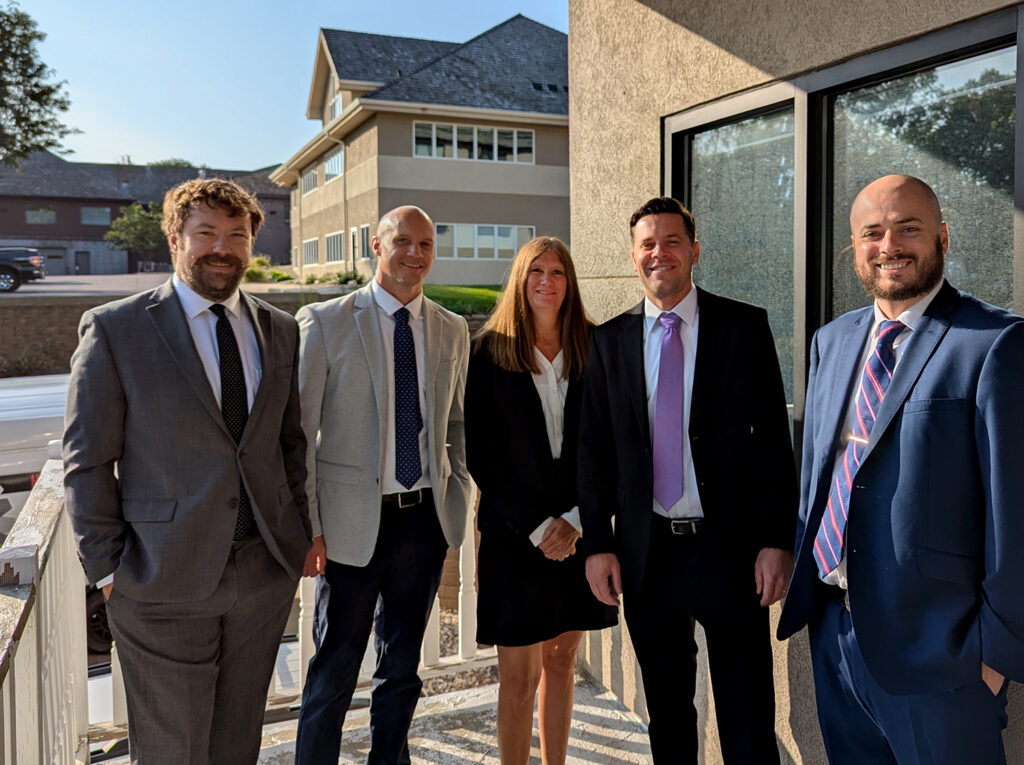Staff of the South Dakota Office of Indigent Legal Services are pictured outside their office Sept. 11, 2025, in Sioux Falls. From left are Deputy Appellate Public Defender Derek Friese, Deputy Appellate Public Defender Beau Blouin, Paralegal Eileen Henze, State Public Defender Chris Miles and Deputy Appellate Public Defender Matthew Mirabella. (John Hult/South Dakota Searchlight)
South Dakota’s first state public defender and his staff of four have taken on 43 cases since taking their first this winter.
Lawmakers created and funded the Office of Indigent Legal Services in 2024 to address the ballooning cost of lawyers for people who have a constitutional right to one but can’t afford it.
The state convened a task force to address that issue in 2023, spurred in part by the doubling of county-paid public defense bills in the space of 10 years.
As of two years ago, South Dakota was one of only two states in the U.S. to collar counties with the full cost of indigent defense. A state-level office, the task force concluded, could begin to relieve some of that pressure.
The resulting Office of Indigent Legal Services doesn’t represent clients at trial — counties still pay area lawyers for that — but instead handles appeals of felony convictions and rulings against parents and guardians in abuse and neglect cases.
Lawmakers put $1.4 million in the office’s budget for the current fiscal year, which began in July. The office was expected to save counties $2.1 million overall and bring a net savings of $600,000 to taxpayers.
Leader hired in 2024
Christopher Miles was hired to head up the office. He’s since welcomed three additional attorneys and a paralegal, and is on the hunt for one more attorney.
The office took on its first cases in February, when the doors opened for appeals from the Sioux Falls and Rapid City areas. In July, it began to take appeals from the rest of the state.
The state office’s team is now working on appeals from Roberts, Hughes and Lawrence counties, on top of its caseload from the metro areas.
Miles and the other three lawyers each have about 10 cases to handle. Thirteen of them involve abuse and neglect. The rest involve felony convictions.
“We’re probably picking up a case every week,” Miles said.
The team has an office in Sioux Falls and one team member in Rapid City.
The only appellate court in South Dakota’s court system is the state Supreme Court. None of the appeals handled by the office have reached the Supreme Court for oral arguments, and the high court has yet to rule for or against the state’s public defenders in cases where they presented arguments on a client’s behalf.
Three cases have been resolved. Two defendants dropped their appeals after consultations with the public defense office. In the third case, the office found no appealable issues and told the state’s high court as much, but the client exercised their right to file their own appeal statement. The Supreme Court dismissed the client’s case by summary judgment, a short statement that doesn’t address specific legal issues.
“We don’t have any wins yet, but we don’t have a lot of cases that have made it through to the point where we’d be expecting an opinion, either,” Miles said.
Scope of work
An appeal doesn’t involve new evidence or new witnesses.
An exciting turning point for the defense of people who can’t afford lawyers
Rather, it involves scouring the existing trial court record to find some error, such as ineffective assistance from a trial court lawyer, erroneous rulings from a judge or a sentence that falls into the unconstitutional category of cruel and unusual.
If there’s an issue for his office to address, Miles said, it’s got to be present within the four corners of the case record, which would include transcripts from hearings or a trial. A win at the state Supreme Court could reopen parts of a case.
Inmates will contact the office at times with hopes of adding new evidence, Miles said, but “we do our best to explain what the restrictions are.”
Future goals
Minnehaha County Public Defender Traci Smith has been pleased so far.
Miles was once part of Smith’s staff of 45 lawyers, paralegals and others, and appeals were his only job.
“Now, we don’t have to have an attorney assigned to appeals,” Smith said.
Smith was a task force member, and manages one of three county-level public defenders’ offices in the state. Her hope is that the state office serves as a stepping stone to address other issues surrounding indigent defense in South Dakota, as outlined in a report on the issue from the Sixth Amendment Center.
Among those challenges were a dearth of experienced criminal defense attorneys in rural areas, and funding for high-profile cases in low-budget counties.
“There are a lot of priorities, but the real progress will come by focusing on a few key goals at a time and building momentum step by step,” Smith said.
GET THE MORNING HEADLINES.


